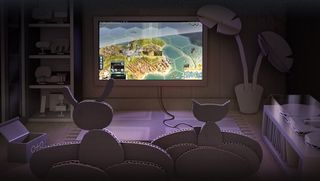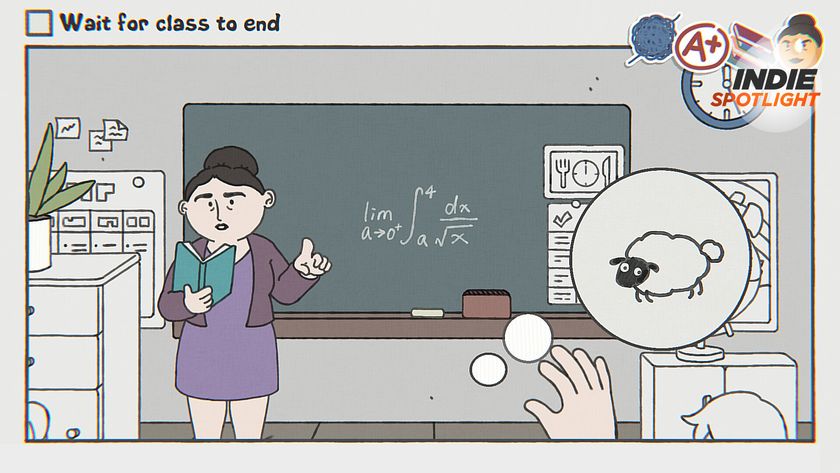PC gaming's future is no longer tied to Microsoft
First there was SteamOS, a Linux-based operating system whose open design aims to spur innovation. Then there were Steam Machines, a range of Valve-branded systems with SteamOS pre-installed that will provide a legitimate non-Windows alternative for PC gamers come 2014. Now, Valve has concluded its trio of announcements with a joystick-less Steam controller, a bizarre-looking (but admirably forward-thinking) input device that allows any Steam game to be played wirelessly from the comfort of your couch.
Taken at face value, these three announcements appear to be nothing more than an attempt by Valve to elbow its way into your living room, hoping its Steam Machines will earn a place alongside your set-top box or gaming consoles. That is, at least, part of the goal, especially considering PC sales continue to diminish each year. But I think there's a significantly more important conclusion to be derived from these announcements. By offering a free OS alternative, one that comes pre-installed on a wide variety of gaming rigs, Valve is attempting the unthinkable: to offer a PC gaming future that isn't inextricably bound to Microsoft.

Each of the three announcements plays its own part in Valve's end-game, and it's worth recapping what, exactly, those roles are. The most obvious starting point is SteamOS, Valve's Linux-based operating system. This, more than anything else, illustrates the ideological differences between Valve and Microsoft, the former emphasizing the value of open platforms, while the latter seems to be transitioning into a closed one. Valve is hedging its bets that major innovations--and therefore major $$$--will come primarily from its users, not from its developers. Remember: Counter-Strike, Portal, Dota 2, and a boatload of user-generated content for Team Fortress 2 have all played a part in Valve's continued success--and none of them were conceptualized in-house. Thus, SteamOS: a totally free alternative to Windows (making it an attractive choice for PC buyers and DIY builders alike) that encourages modding and experimentation.
The takeaway from SteamOS, then, is that openness breeds innovation. Valve's putting the very source code of its operating system in the hands of everyone who wants it just to see what happens. Comparatively, Microsoft is pushing its Windows Store, turning Windows into an increasingly closed platform (i.e. one that charges costly development licensing fees and restricts access to certain content providers). It will inevitably stifle creativity and technological advancement in the pursuit of profit (or at least that's what Valve believes)--a pursuit that could, eventually, knock on Valve's door and personally hand over an eviction notice.

Now let's take another look at Valve's Steam Machines. These will likely range from inexpensive streaming devices akin to a Roku (that have the added benefit of allowing you to stream titles from your gaming PC to any display in your home) to sleek, attractive boxes not unlike consoles to full-on high-end gaming desktops. Myriad options means you can find a Steam Machine that will accommodate your exact needs. But, more importantly, these are the trojan horses whose purpose is to get SteamOS in your home, to acquaint you with a new, non-Windows operating system that, someday, just might diminish the public perception that PCs are synonymous with Windows.
Then there's the Steam controller. It's an interesting design, to say the least, and I'm mega pumped to get my hands on one. But I can't help but wonder: Will PC users adopt anything other than the mouse and keyboard? Will console gamers accept a gamepad without analog sticks? Time will tell. The big thing here, though, is that this controller works with all Steam games, even if they've not been optimized for a gamepad, eliminating the final hurdle of playing said games from the sofa: not having a couch-friendly input device that supports your entire library.
Yes, all of these things--the SteamOS, Steam Machines, the controller--are an attempt to sell you something, but to think of that "thing" as just another gaming machine for the living room is incredibly shortsighted. What Valve is really selling is an alternative future for PC gaming, one that diverges from the whims of Microsoft. This path is an ideological one as much as it's motivated by turning a dollar.
Sign up to the 12DOVE Newsletter
Weekly digests, tales from the communities you love, and more

But Valve has some immense hurdles to overcome if it's to be successful. Can it convince big publishers to port their games to Linux, an operating system that has a remarkably small presence in the gaming space? Perhaps once Valve gives every Steam member the opportunity to beta test SteamOS, we'll see some of the bigger players raise their eyebrows. Then again, perhaps not.
Can Valve explain to gamers, in a digestible manner, why open platforms are crucial for innovation, and how SteamOS will be any different than Windows long-term? If so, will Valve be able to convince you, the consumer, that investing your time into learning SteamOS, or money into a Steam Machine, is a worthwhile endeavor? Apathy, I think, is the greatest challenge Valve will inevitably face.
If you have any interest in PC gaming, you'll have a big decision to make come 2014. The question is: who will you entrust with this slice of gaming's future?
What's Next? is a bi-weekly column exploring the future of gaming tech.
Ryan was once the Executive Editor of GamesRadar, before moving into the world of games development. He worked as a Brand Manager at EA, and then at Bethesda Softworks, before moving to 2K. He briefly went back to EA and is now the Director of Global Marketing Strategy at 2K.
Most Popular







